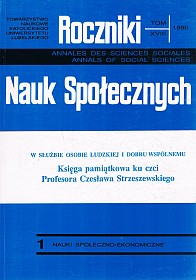Uniwersalność praw i obowiązków człowieka
Abstrakt
The author points at the necessity to work out of universal conception of human rights and duties. In this paper he presents an outline of such a conception. The extant conceptions are partial and imbued with ideologies. They are based on false visions of man. The universal conception of human rights and duties can be worked out in tune with the interdisciplinary studies.
The author removes everything that is irrelevant in this field under consideration to show the universal character of human rights and duties by way of dialogical, fundamental, prophetic, and situational criticism. In the dialogical criticism he revises, on the one hand, the current conceptions of freedom and freedom rights, and, on the other, the way in which human social rights are understood as state alms. Talking about the fundamental criticism he emphasizes the fact that the principle of human rights should be taken in its connection with other social principles such as: the principle of person’s dignity, of common good, of auxiliariness, of justice and others. The prophetic criticism is supposed to show not only the aspects of the infringement on human rights, but first of all the mechanisms of their infringement. The situational criticism permits the author to show that the so-called relative character of human rights concerns their hierarchy and modes of their carrying out, which modes are dependent on the history and culture of various nations; the basis of the universal character of human rights and duties is person’s dignity which is a universal value, independent of history, culture and other social-political systems.
The author takes the standpoint according to which one cannot present the universal theory of human rights without showing beforehand an integral vision of man. He emphasizes that person’s dignity is an innate, universal and indispensable value. On the basis of this value he formulates a fundamental normative principle of human rights and duties: „persona est affirmanda propter se ipsam”. Secondly, while defining the contents of human rights he refers to the psychosomatic nature of man, which nature is the groundwork of various needs. The basic needs bear a universal character. Yet it is not needs that are human rights, their contents being values capable of fulfilling these needs. It is a human right to be entitled to a certain value (Rechtswert). Thirdly, man should be looked upon as a social being (ens sociale). This kind of approach to man allows to rationally explain the correlation between rights and duties. Fourthly, man cannot be taken as a „small god”, since he is able to do good, but also evil, to build concentration camps, to commit genocide, to steal, to lie and the like. The affairs being as such, we have to state that one cannot talk about absolute, boundless rights of freedom granted to man. They are bounded not so much by the freedom of other individuals as rather by truth and common good.
The author is not satisfied with a mere presentation of the universal character of human rights, but also points at the necessity to work out a universal strategy of their defence. He says that it is necessary to establish an international authority and form democratic structures within the world society. The effective and universal defence of human rights may be guaranteed by a solidary cooperation of all nations for the sake of development. Nevertheless the very defence of these rights is already a crucial factor of the social, economic and cultural development of nations.
Copyright (c) 1990 Roczniki Nauk Społecznych

Utwór dostępny jest na licencji Creative Commons Uznanie autorstwa – Użycie niekomercyjne – Bez utworów zależnych 4.0 Międzynarodowe.


